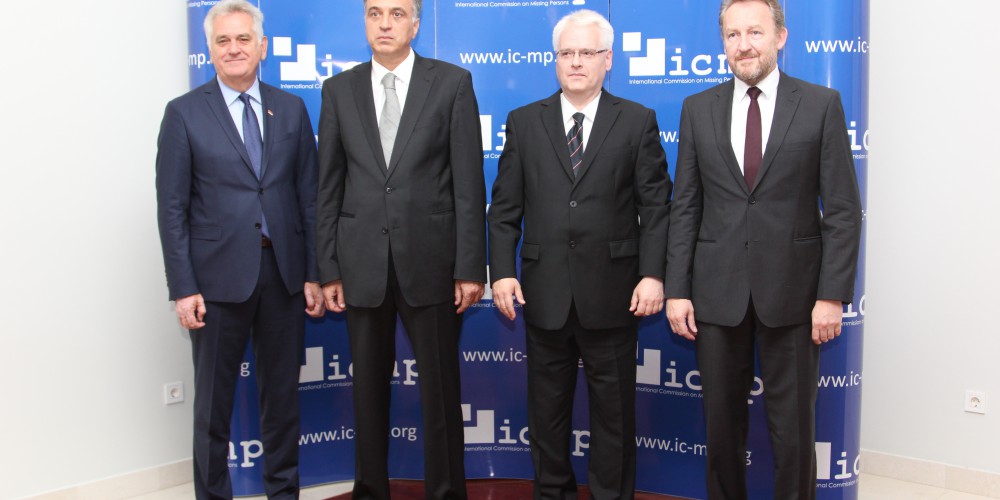“The International Declaration is an historic document which defines for the first time the responsibility of States in accounting for the missing”
In an historic event hosted by the International Commission on Missing Persons (ICMP), the Chairman of the Presidency of Bosnia and Herzegovina Bakir Izetbegović, President of the Republic of Croatia Ivo Josipović, President of Montenegro Filip Vujanović and President of the Republic of Serbia Tomislav Nikolić signed a “Declaration on the Role of the State in Addressing the Issue of Persons Missing as a Consequence of Armed Conflict and Human Rights” in Mostar’s City Hall today.
The purpose of the Declaration is to define the role of States in accounting for the missing from conflict and human rights abuses. The first signatories to the international Declaration include those countries and their successor States that were a party to the Dayton Peace Agreement. Of the 40,000 persons missing from the armed conflicts of the 1990’s in the former Yugoslavia, over 70 percent have been accounted for. This is unprecedented in any post-conflict context anywhere in the world.
“The Declaration to be signed today is a mutual recognition of the achievements Bosnia and Herzegovina, Croatia, Montenegro and Serbia and will be used to advance the principles that have formed the basis of their accomplishments,” said ICMP Chairman Thomas Miller during the event which was attended by representatives of regional governments, NGOs and the diplomatic community. “The countries of this region have demonstrated the increasingly significant ability of States to assume ownership for the process of accounting for large numbers of missing persons, both through their domestic institutions and through specialized international mechanisms, such as the ICMP.”
The Declaration seeks to highlight the primary responsibility of State authorities in addressing the issue of the missing and the need to ensure that mechanisms and methods employed conform to human rights standards and rule of law principles. In addition, the Declaration seeks to ensure that the rights of family members of the missing are upheld at all times, and that survivors and civil society alike have access to information regarding the fate and to a proper investigation; as well as to the truth and justice. The Declaration seeks to ensure that past wrongs are addressed through accountable and just State institutions.
The Declaration is an international instrument and ICMP will encourage other countries to sign, both in the Western Balkans and in other parts of the world. Countries such as Argentina, Chile, South Africa and many others that are confronted with the issue of missing persons will also be invited to sign.
Others present during the signing ceremony included families of the missing, including members of the Regional Coordination of Family Associations of the former Yugoslavia, as well as prominent members of the international community including the OSCE represented by Special Representative of the OSCE Chairperson-in-Office for the Western Balkans Ambassador Gerard Stoudmann and the UN Deputy High Commissioner for Human Rights, Ms. Flavia Pansieri.
ICMP was established in 1996 at the G-7 Summit in Lyon, France, to support the Dayton Peace Agreement. ICMP is today actively involved in helping governments and other institutions around the globe address the issue of missing persons from armed conflict, human rights abuses, disasters, organized crime and other causes
ICRC says missing in Sri Lanka must not be forgotten
The International Committee of the Red Cross (ICRC) urged the international community not to forget missing persons worldwide, including those in Sri Lanka.
“States have an obligation under international humanitarian law to take all feasible measures to clarify the fate and whereabouts of people who have gone missing and to inform their families accordingly,” said the vice-president of the ICRC, Christine Beerli.
Stating that the ICRC was working on the cases of 52,000 missing persons worldwide, staff member Marianne Pecassou said:
“This figure is just the tip of the iceberg, since these cases are only the ones brought to the attention of the ICRC by relatives. We know that many more people remain unaccounted for around the world.”
The statement which was published ahead of a new report – ‘Living with Absence: Helping the Families of the Missing‘ – to be published August 30 to mark International Day of the Disappeared, states that 16,000 are missing in Sri Lanka.
According to the UN Panel of Experts report over 40,000 are unaccounted for, whilst in November 2012, the UN Secretary General’s internal review panel put the figure much higher at 70,000.
“Around the world, whether in Colombia, Georgia or Sri Lanka, relatives of missing people feel a similar longing and a need to find closure, even if it is just a patch
of earth on a gravesite. For many, there are economic, administrative, psychological or psychosocial factors that prevent them from rebuilding their lives,



